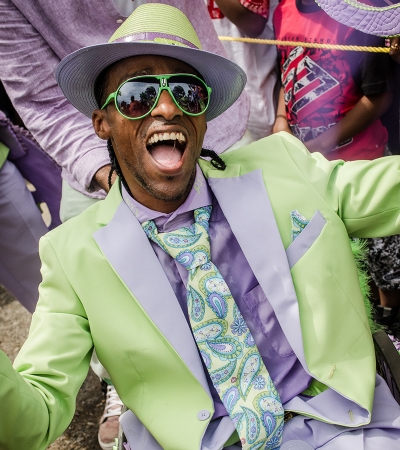Pigeon Town
I was born and raised in Pigeon Town. It’s located from Carrollton to St. Charles Avenues, and from Carrollton back to the river. It was a neighborhood of families. My grandmother, Mrs. Edna Henry, grew up there too. You’d watch what you’d do because your neighbors knew you: “That’s Miss Edna’s grandson.” She stayed right next door to Jake’s Grocery store on Dante and Spruce Street, and we stayed with mom two streets down on Panola Street. My mom worked at Oschner Hospital for like 40 years, and my grandmother was a chef who worked at a couple of restaurants. She just loved to cook even in her last days when she had diabetes and high blood pressure. She lost both of her legs, and my mom retired to take care of her. She still was trying to cook. All the family come over on Sundays because we know she cooked big.
Things have changed with gentrification—a lot of people you don’t know anymore, it’s a different neighborhood all of a sudden. It feels good to still have our parade going in our community. Especially with the gentrification, this is like a reunion for us now. Easter Sunday, we get to see people that don’t live back here no more—who we haven't seen in a long time. Due to Katrina, a lot of people come from out of town as well. As we parade through the streets, I see smiling joy on people's faces. They’re yelling congratulations at you, and it’s a good feeling to know you pulled this off; the rain held up. I really do a lot for the club because we are small—we’ve been known to have five or six members. It’s time consuming. When you're about to come out that door, you get them butterflies knowing that you made this happen—you made a lot of people's day that you did not cancel this. We go down the back streets on purpose because we want the older people who can’t follow the second line to watch us. We get a lot of feedback from the neighborhood people that they like that we passed.
My grandmother was our queen a couple years. She loved being queen when our parade day come up. She’d ride in a car, just watching. For years, she was in a club called Young and True Friends.
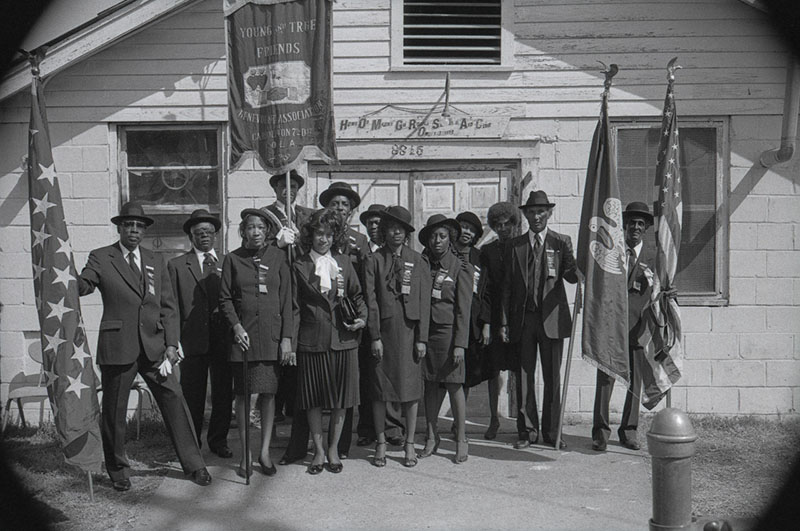
That was really our first second line club in the neighborhood. They used to come out of a funeral home on Oak Street between Cambronne and Joliet, and parade through Pigeon Town, but it was so long ago that they hadn't come out. I witnessed it as just a little child. On the other side of Carrollton, there's a cemetery, the Green Street graveyard, where a lot of our family and people from the neighborhood buried at, and I saw them there.
My uncle grew up around the Young and True Friends. He gravitated to it. The Lady Buckjumpers came through the neighborhood every now and then, but their route would change. On Sundays, he's going out to the ones in the Third Ward, downtown. Our uncle was somebody my brother Sylvester, who’s two years younger than me, and I looked up to. He’d take us to the childhood places like swimming, and we asked our mom if we could go with him to the parades and fell in love with it. If I'm somewhere at a second line and he's not there, “Man, where's your brother?” And if he's at the second line: “Where's your brother?” It's not a place he can go by himself somebody gonna ask for me, I go by myself, they're gonna ask for him. Because we’re always together.
When I was 12 years old, we were over at my grandmother’s house on a Mardi Gras night. My cousin and I were the oldest out the grandkids, and she asked us to go get her some chicken at Popeye’s. I rode my cousin on the handlebars. We made it two blocks from the house when this guy come out shooting. Being kids, didn’t know what was going on—we just got scared. I fell off the bike not knowing what had happened. I'm lying there on the ground, and my cousin’s in shock. The police pass and we’re thinking we're about to get some help, but the car keeps going. The shooter realizes we were the kids from down the street, and he knows my family. With the police gone, he ran out of his house to come get me. He picked me up, and brought me back to my grandmother’s house, saying he’s sorry. He laid me on the porch and ran home. I have older uncles, and I don't know if he was in fear of what might happen to him.
My grandmother and them come out of the house hollering and screaming. And now I'm in the hospital, and I realize I'm in a wheelchair. When am I going home? I’m wondering how to move around in a wheelchair. I don't want to say it was mind boggling, but I think it was something like an adventure. I didn’t realize I’ll be in here for a long time. When I came home, my family was there for me because I’m in a chair, and I felt handicapped. Whether I say that to them or not, that's how I was feeling. I started to do things on my own without calling nobody. My mom would come in and say, “Boy, how did you get up there?” I was shocking them.
In the neighborhood, we’re all playing and I'm in the chair. They’re playing basketball, and I don’t want to be a spectator—I want to play too. They put me on their teams. For football games, they'd let me be the quarterback, and we’d all go bike ride somewhere and they let me hold to the back of the seat. I’m coming too. I wasn't getting left behind.
A New Club for the Neighborhood
As we grew up, we were like, “Man, we want a second line club in our neighborhood, let's bring one to Pigeon Town!” One time, they gave me a birthday party and we took the band all through the neighborhood like a second line to the Green Street Cemetery and back to the party without the police stopping us. I think that motivated us to start our club. There were about twenty founders. We had a lot of members who were all from the neighborhood, and more clubs were calling themselves where they was from, so we were like, “Man, we gonna be the Pigeon Town Steppers.” But you don’t just have to be from our area to parade—we welcome you from anywhere.
What day do we come out on? It had to be a Sunday. What about Easter? The first year, in 1994, we went renegade with it—no permit, no nothing. We just did it. We had us some little Chuck Taylors and some airbrushed blue Dickie outfits with the Kangol hats.
To raise money for the club, we did fundraising at the Merry-Go-Round Hall in Pigeon Town run by a guy named Mr. Charles Irons, who had been a member of the Young and True Friends. On top of his hall, he has a little piece of wood that had the name of his club. He used to tell us about the club and how he wanted us to really take on their charter to keep the name going. But back then, we didn’t know nothing about a charter. We just wanted to second line.
We came back the second year with burgundy outfits. That’s when we realized we had a crowd behind us. People were expecting us again. We’ve got to do it for real—legit—before next time the police stop us. In those first two years we never got stopped. By the third year, we ended up doing it the right way. We got with a lady we called Ms. Strick who is from our neighborhood and was close with my grandmother. She was one of the original Lady Buckjumpers. She really showed us the way—how we were supposed to get incorporated as a club, and how to go down to the police precinct and pay for your permit.
We’re known to have a nice spring day. People come back from church, and put on something for the parade. We mix our route up, but we’re going to cover three areas: Pigeon Town, Gert Town, Hollygrove, and end in Pigeon Town.
Every year, we make it our business to pass by the Green Street Cemetery to show respect to the people that we lost. My grandmother passed in 2012, and we buried her in Green Street. We all want to go there. A lot of people don’t know the history of Green Street and want to go to in a wall at Providence Memorial Park and Mausoleum in Metairie. You can't second line to Providence, but you can second line to Green Street. I think it is a different feeling when you go visit a person at the gravesite than the wall. When you’re looking in at dirt, you feel more connected.
At our second line, I got a guy who pushes me, Jamal Hall. He second lined with us for a little while, and he got out of it, but he pushes me. When we come out the door, I’m always in the middle. If the location doesn’t have stairs, I like to roll out on my own to do my thing. I’ll pop some wheelies, do a spin around. Then tell him I’m ready. But if there are stairs, Jamal brings me down, and then he knows how to work the wheelchair while I work the fans, so we be on the same page. Ain’t nothing nice when you get caught off guard.
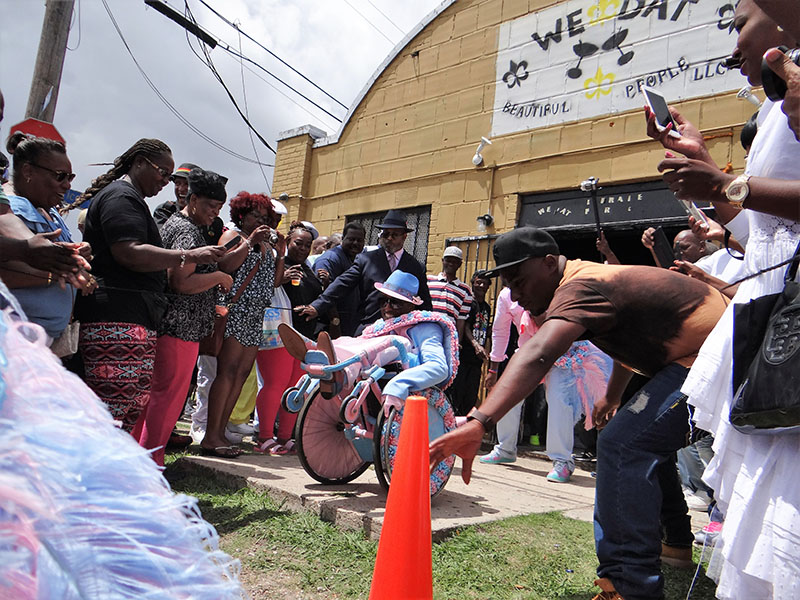
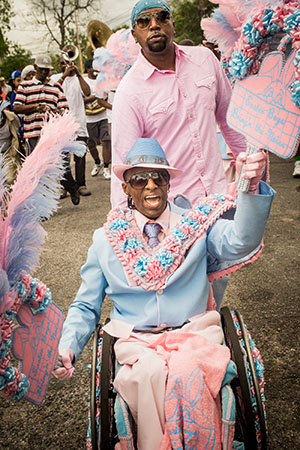
When he swings me, I know how to come up and catch myself and lean to the side because I done built trunk muscles from being in the chair so long—they’re techniques that that other guys in my predicament fresh probably wouldn't know how to do. It’s hard to explain, but I have that balance partly because I’ve been playing wheelchair basketball since 1994. I play with people on their feet but playing with people in my condition felt like joining the NBA. It keeps me in shape for parades as well.
When you’re in the zone with the music, you’ll do a move, and might shock yourself. It comes from how I'm feeling that music, and it makes me want to get the chair up, turn around. Some beats just make it go off, and in my mind, it’s like I'm on my feet. The music makes you do all of those things. How does Gerald Platenburg climb so high and dance on top of buildings? Shine. The music carries you. That momentum had you getting up there easy, but I’ve seen some people wonder how they’re going to get down.
For the first ten years, we ended next to Mr. Iron’s hall where there was an empty lot, and we would have an Easter egg hunt and spacewalk for the kids, a stage for the performances, and free seafood. So many people gathered at the end, and we were fortunate to never have a shooting. But the city had too much violent things happening, and we felt it was time to shut it down before something happened; we didn’t have a permit for it, or police protection. We decided to let everybody disperse. It was the best thing we could have ever done because the after parties were giving a lot of second line clubs a bad look because they were getting the blame when something happened, even if it wasn’t during the second line.
Recognition
Our club’s biggest exposure came after Hurricane Katrina when the police tried charge everybody an excessive fee to parade. Mind you, we're in Houston, displaced. We had our parade in 2005 before the storm. In 2006, some clubs were able to come out towards the end of that year. By spring of 2007, we wanted to be out there because we ain’t trying to miss two years. We're trying to get all our stuff together, getting in touch with our members, and I got with the people in the city. They gave me the paperwork with our fee. I said, “Whoa, that’s got to be a mistake, ain’t no way it can be $7,560 dollars!”
Before Katrina, a regular Sunday costs the second line club $1200. We were Easter Sunday, and they told us that was a holiday, so we were paying time and a half— $1900 on a Sunday. We felt like we shouldn’t have to but, it was Easter, and we wanted that Sunday. Now, Katrina came, and everything changed. The clubs who come on regular Sundays now have to pay 1900 dollars to come out and we had to pay $7,560.
The American Civil Liberties Union had approached other clubs if they wanted to be the first ones to do a First Amendment lawsuit, Social and Pleasure Club Task Force V. The City of New Orleans and take the issue to court. They didn’t want the police to have a bad eye on them. But with the amount they were telling us we had to pay to parade, we didn’t hesitate, so we were one of the clubs that brought the lawsuit, and of course, we had other clubs backing us up. Two lawyers, Ms. Katie Schwartzmanm and Ms. Carol Kolinchak, who work for the ACLU were our lawyers, and the city backed down right before our parade. The writer Dan Baum heard about it and published a story about it in The New Yorker, and Larry Blumenfeld’s article, “Not Wash Away” in the The Village Voice featured a picture of us parading that year. We’re in powder blue and yellow, with my wheelchair decorated with Kevin’s Dunn’s designs. When the HBO series Treme came out, they have a part about our club going to court, and we got to be in the show.
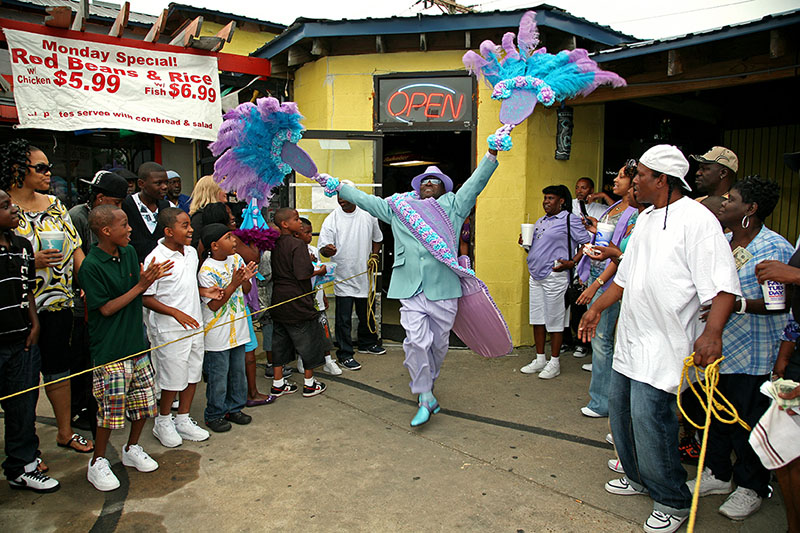
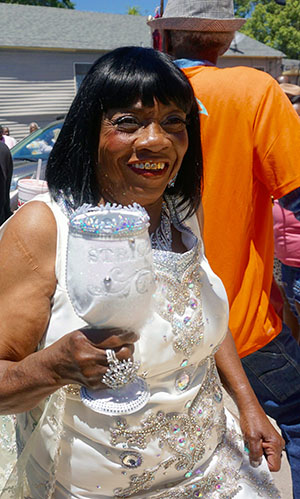
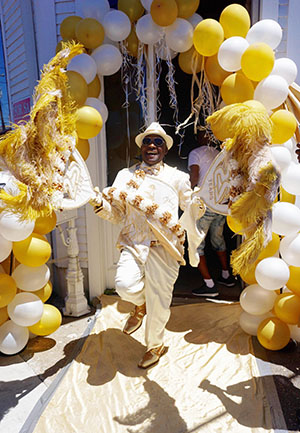
We come up with our own design, but Kevin Dunn puts everything together. Clubs usually mark anniversaries every five or ten years. For our 10th year anniversary, we wore white. For our 20th, we came out twice with two different suits, but it didn’t come out right. We wanted to do it again for our 25th year when Ms. Strick was honored as our queen. We’re not known for coming out twice, so when we come out that door, we want them to think that’s it. Our first colors were cream and gold. Everybody was going to think, “They didn’t wear the pastel colors this year!”
“It’s their anniversary.”
“Oh, okay, I understand.”
The word had gotten out that we were going to change: “Man, we heard y’all was gonna change. I know y’all aren't gonna take that off!” That’s just what we wanted to hear. We got them! We felt accomplished, like we did it—we really had them fooled.
We came out again in orange and seafoam green with a second pair of alligator shoes. It's something we really wanted to add to this second line history.
We started from the bottom and now we got our respect, as far as one of the best in the game like the Lady Buckjumpers and Sidewalk Steppers. That’s what it’s really about: you are being recognized; other clubs really know who you are. Like, “Oh yeah, they be clean every year.” It makes it harder to let go when you’re there now, you’re noticed, you're out there. It ain’t the time to just say, “Okay, I can't do it no more.”

